10 Ways to Make Your Dog Comfortable in a Hotel Room
I travel with my dogs everywhere. It’s one of my favorite things to do!
But I don’t want my happiness to be at the expense of theirs. I do my best to respect their preferences and make them as comfortable as possible.
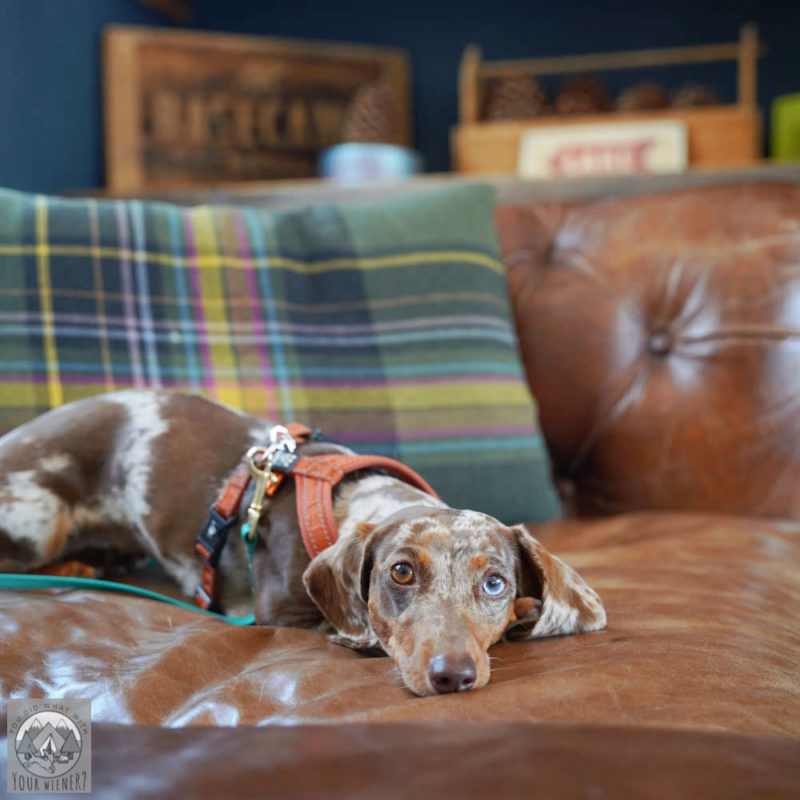


I find that one of the most stressful travel experiences for my dogs are when we stay in a hotel room (or similar like Airbnb).
Over the years, I’ve developed a routine for keeping them comfortable and happy.
I know I’m not the only one who stays with dogs in hotels so I want to share my tips to help make vacation a more enjoyable experience for all.
Disclosure: Some of the links in this article are affiliate links (Amazon Associate or other programs we participate in). As an affiliate, I earn a small commission from qualifying purchases. Also, some brands compensate me for sharing them with you.
1) Only Stay Where Dogs Are Allowed
I am against people sneaking dogs into a hotel room when they know pets are not allowed there.
It’s disrespectful to the hotel, can trigger future guests with allergies, and can get you fined or kicked out if you get caught.
If you sneak your dog into a hotel, you will be overly concerned with not being spotted so you may not take your dog out to potty or for a walk as often as you should.
Making your dog hold it for long periods is not only uncomfortable but can also lead to a urinary tract infection (UTI) or kidney issues.
It can weaken the bladder muscles and potentially contribute to incontinence down the road.
Not giving your dog enough exercise can cause them to get irritated and stressed.
Also, YOU will no doubt be stressed or a little on edge because you don’t want to get busted breaking the rules.
Dogs can often sense how we are feeling even even before we do.
Your dog will pick up on your emotions and become stressed themselves.
You and your dog will be more comfortable and relaxed if you stay at an establishments that allows pets.
2) Ask For a Room on the Ground Floor
Asking for a ground floor room, and one preferably near and exit, will make potty breaks quick and more convenient.
On the ground floor, you won’t have to spend time waiting for an elevator. or climbing up and down flights of stairs, with your pooch.
It also means you will be back snoozing in bed sooner if your dog needs to go out in the middle of the night.
3) Let Your Dog Explore Their New Surroundings (With Supervision)
The first thing a dog will want to do when entering a space not familiar to them is to sniff around.
They want to get familiar with the room before they settle down.
Let your dog do this but follow them around, preferably scanning the area before they stick their nose and mouth there.
We all expect a hotel to be clean when we check in, right? Well, let me tell you from expeirence, this is not always the case.
Hotel room cleaners are just like us, sometimes they make mistakes and miss something.
There have been several times my dogs have disappeared under the bed only to come out gobbling some kind of old, gross, food.
If the food is rotten, it could upset your dog’s tummy.
If it’s something that dogs absolutely shouldn’t eat, like sugar-free gum with Xylitol, you could be spending your vacation at the emergency vet.
4) Bring the Comforts of Home With You
The #1 key for keeping my dog’s comfortable during a hotel stay is to make it feel like home away from home.
The best way to do that is to bring their favorite dog blanket.
But make sure you haven’t washed it recently!
You don’t want it to stink but you definitely want it to have the smell of your house, you, and their own smell on it.
We’ve been using the Tall Tails fleece dog blankets for years.
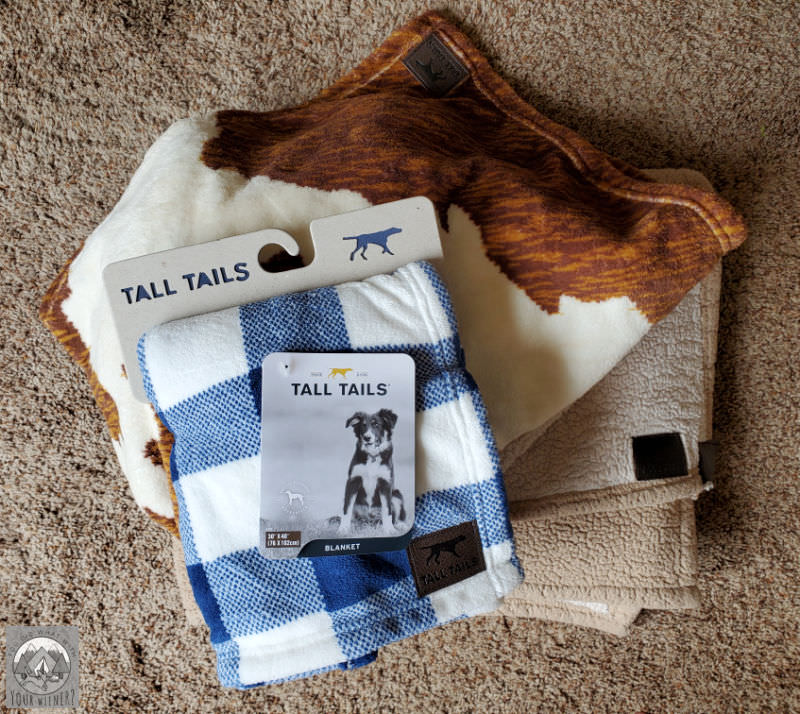


The dogs love how plush they are and they look practically new even after a hundred washes.
My all-time-favorite is their sherpa dog bone blanket but I’m also loving their new cowhide pattern fleece dog blanket.
5) Bring Toys to Keep Your Dog Busy
Dogs that aren’t given something to do will find ways to entertain themselves.
There are benefits to each different dog play type.
Bring along toys you can use to engage with your dog, and expend their energy, like this Natural Leather Bone Tug Toy.
Bring toys you can put treats in to keep your dog busy while you’re working, showering, or have to run out of the room for a minute.
The licking can create a soothing effect too.
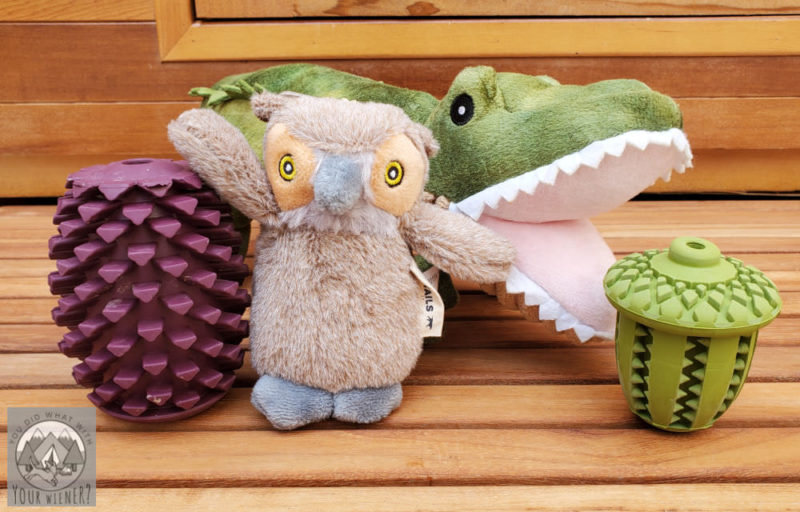


And don’t forget to bring a plushie toy.
A soft, squeaker or crinkly toy is mentally stimulating and the soft fabric will retain scents from home, helping your dog to feel comforted.
This baby owl with squeaker or crunch alligator toy are good options.
If you bring toys that make sound though, just hope that the walls aren’t paper thin so that your neighbors can hear it.
It’s also a good idea to limit noise-making play to typical non-quiet-time hours like between 9 am and 9 pm.
6) Try to Maintain Your Dog’s Normal Routine
Maintaining a similar routine to the one you have at home can reduce stress because your dog isn’t dealing with several changes at once.
For example, my dogs have a dog crate at home that they can use as a “den” to retreat to if they need a little alone time.
I bring a lightweight, collapsible dog crate with us when we stay in hotels so they have this same opportunity there.
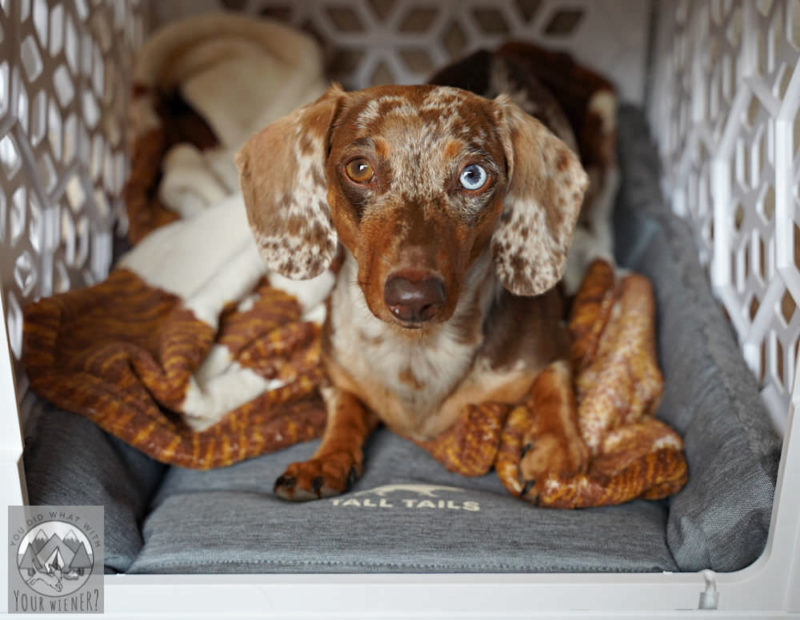


I make it a welcoming nest by placing a crate pad (we’re currently using the Dream Chaser dog crate bed from Tall Tails) and a fleece blanket in it (one that smells like home as mentioned in tip #1)
Also, at home they eat at 7 am and 430 pm. I try to be at the hotel during those times so I can give them their scheduled meal.
Speaking of eating, try to feed your dog the same food you do at home while you’re on vaccation.
If you can’t do that, at least experiment with the food you’ll be feeding your dog before you leave home.
Start mixing it with your dog’s regular food at least a week before your vacation and maybe try giving your dog a full meal of the new food to see if your dog will eat it.
7) Exit the Room Before Your Dog
Encountering strange dogs or people in the hall can stress your dog out.
You can avoid this by sticking your head out of the door before your dog is allowed to cross the threshold.
Ask your dog to sit before you even open the door and make them wait until you say it’s clear to come out.
If your dog isn’t trained to wait behind the door, you can have someone else inside the room hold the leash or tie it to something solid like a bed leg.
8) Make Sure Your Dog Gets Plenty of Exercise
You may have heard the phrase, “A tired dog is a good, happy dog.”
While this may not be 100% true depending on the dog, it mostly is.
Sometimes on vacation we are so busy driving around to enjoy the sights that we forget to take the dog for a walk.
Make sure you are walking your dog at least once a day when you’re staying at a hotel so they are less likely to be on edge when they hear little sounds.
This rule applies to arrival day too.
If your dog has been riding in the car all day, be sure to stop at a local park or trail to let your dog expend some energy before settling into your room for the night.
A tired dog is less likely to bark, pace, or chew things they shouldn’t.
9) Don’t Leave Them Alone (for Long Anyway)
There are times when it’s unavoidable to leave your dog in your room.
Sometimes you wish to use the communal washer and dryer and can’t juggle your dog’s leash and your laundry at the same time.
Sometimes you need to grab something from the lobby and you don’t want to disturb other guests checking in by bringing your dog.
Sometimes you need to pick up food from a non-dog-friendly restaurant to bring it back to your room.
However, keep in mind that even the most relaxed dogs can be on edge when they are in unfamiliar surroundings with strange smells and noises and you’re nowhere to be found.
Leaving your dog alone in a new situation can trigger separation anxiety, which will stress your dog out.
This can result in messes on the floor, costly damage to the room, or nuisance barking that disturbs other guests (some hotels will even ask you to leave if your dog is disruptive).
Be courteous to other guests and keep your dog’s barking to a minimum. If the hotel receives a complaint, you and your dog bay be kicked out.
To be safe, it’s best to not leave your dog in the room alone at all or only for short periods.
10) Know Your Dog’s Stress Signals
Knowing how your dog looks or behaves when they’re stressed can help you catch any issues early and try to fix them.
While not all dogs exhibit the same signs and symptoms, and they don’t always display the same ones in all situations, VCA Animal Hospitals lists some common signs your dog is stressed.
These include:
- Pacing or shaking
- Whining or barking
- Yawning, drooling, and licking
- Panting
- Hiding or cowering
While you likely can’t end your vacation early and go home if your dog is stressed, noticing these signs can lead to you making changes that put your dog at ease.
If doing things like going for a walk, petting and talking softly to your dog, or giving your dog a stuffed treat toy don’t help, you may want to consider giving your dog a natural calming supplement.
My go-to for stressful situations is HempMy Pet Organic CBD dog treats.
Final Thoughts
Taking a vacation with your dog can be an amazing experience.
It can also be stressful for your dog..
Following these tips at hotels that let dogs stay will help make sure the experience is enjoyable for everyone.
If you’re staying in an Airbnb, check out these tips for staying in a dog friendly Airbnb from Travelnuity.
There are some important differences, and things to consider, when you’re not staying one with your dog (instead of a hotel).
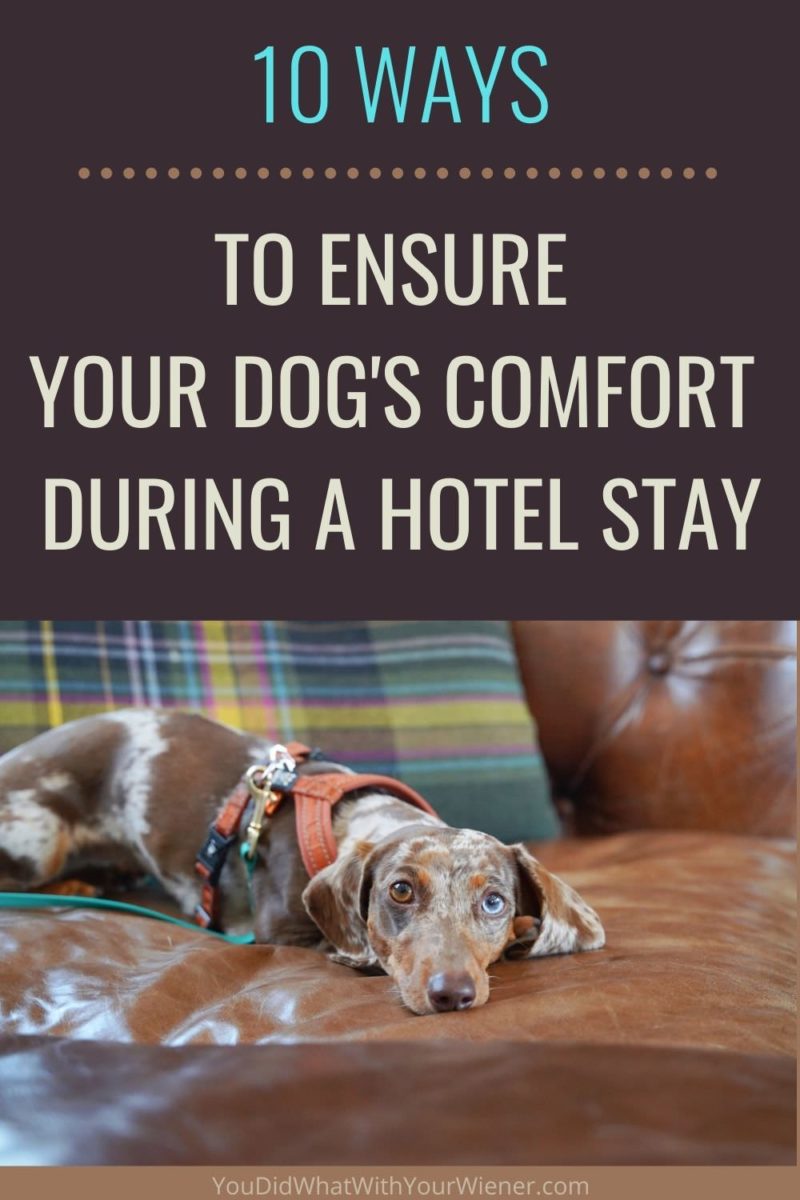


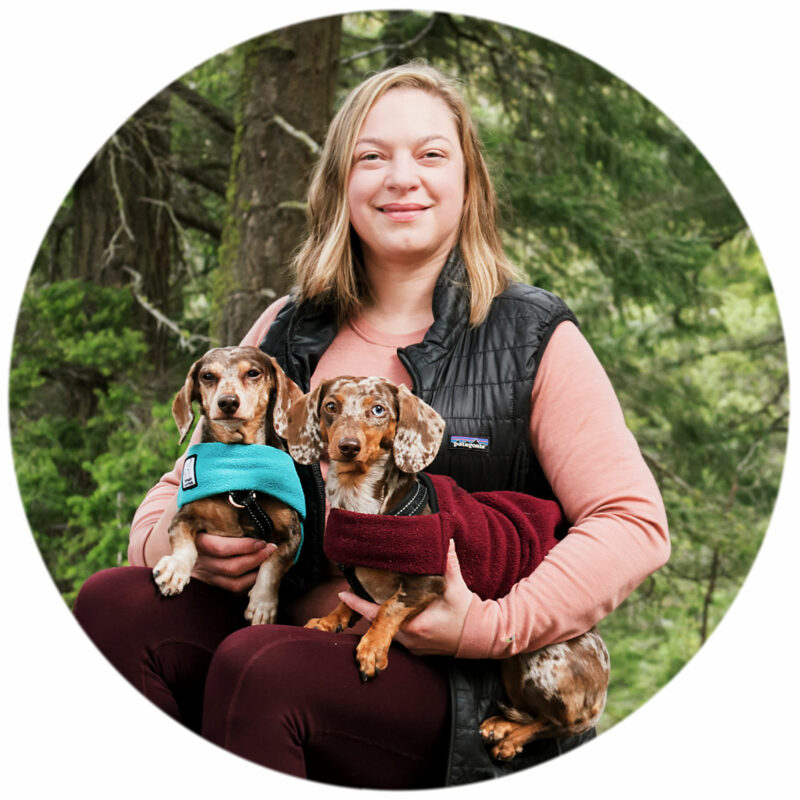


About the Author
Hi, I’m Jessica. I’ve been studying the Dachshund breed since 2007, owned 3 of my own, and shared in the lives of thousands of others through their owner’s stories. When I’m not sharing what I know on this blog, you can find me hiking, camping, and traveling with my adventurous wiener dogs.

Hi Jessica –
These are great tips. Here’s one more. I have barkers, who alert to hotel noises. Every night we play “strange noise = treat!” , and pretty soon they start looking forward to the hotel noises rather than alarm-barking at them. It’s worth bringing extra-wonderful treats for this game. We play this game at home, too, so it doesn’t take many repetitions in the hotel room for them to recognize the game and settle down.
Absolutely love this article, as well as the extra idea from Chris. We’ve definitely found that number ‘6. Maintaining Routine’ is super important. As you said, it reduces overload – they’re already processing a lot and keeping their routine is comforting. We also try to schedule things so that they’re left alone in the room as little as possible and, most importantly, that there’s a significant amount of time before we do leave them alone for the first time. To give them as much time as possible to adjust. Thanks again for such a great post.
Hi John. I am not able to check my blog comments often in the summer because we are so busy. So I apologize for the delay. I’m glad you found my article helpful and thank you for sharing your additional tips.
The dog is difficult to travel with, so thank you for your help